How Sales and Marketing is Going Automated with AI technologies
AI • Jun 08,2016
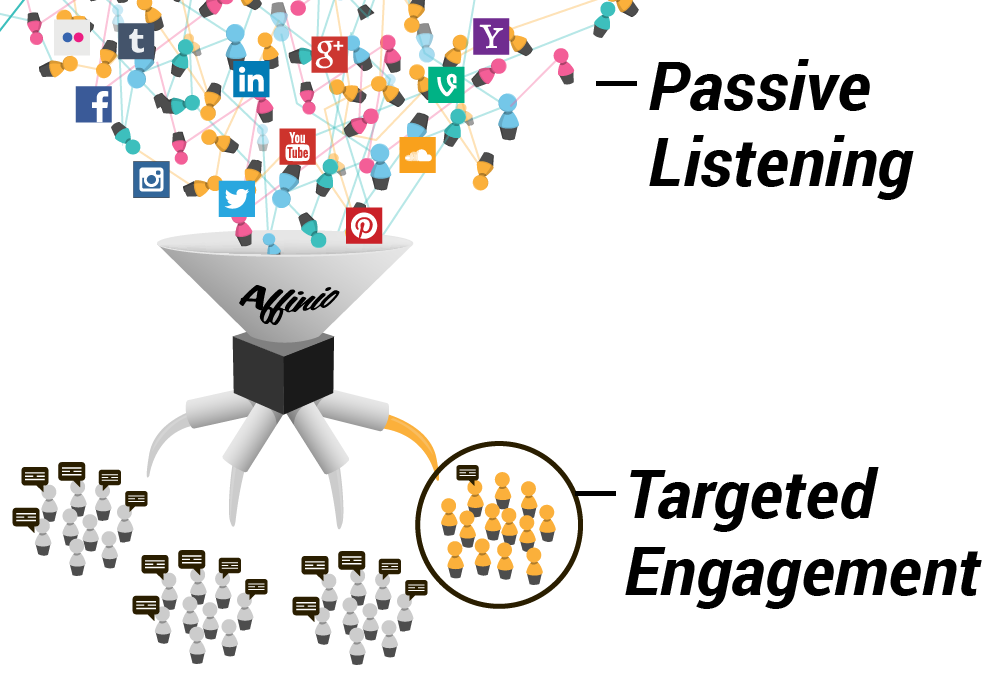
How Sales and Marketing is Going Automated with AI technologies
AI is coming to a sales and marketing departments. In just 10 years most salesperson in the USA and Europe can be replaced with artificial intelligence, analysts predict. Sales person and marketers can create instant data on new potential customer prospects, enhance information on those already identified, improve data modeling and track consumer sentiment. Of course, data regulation must be taken into account, but nevertheless, the potential is huge. We created a list of sales and marketing AI solutions, available today.
Affinio: marketing intelligence platform
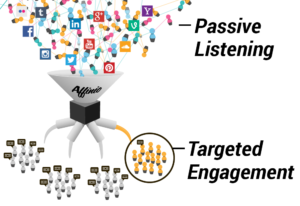 Affinio is a marketing intelligence platform that leverages the social graph to understand today’s customers through their interests. It helps clients to develop data-driven content that will resonate with targeted customers and identifies the best channels to distribute and promote the client’s content (like websites, social networks, brand partners, influencers, and celebrities). Brands and agencies are currently developing strategies based on insights derived from users who regularly create content (only 10% of an audience). This ignores the silent majority (90%) who represent the largest percentage of potential customers. Affinio is ready to solve this problem.
Affinio is a marketing intelligence platform that leverages the social graph to understand today’s customers through their interests. It helps clients to develop data-driven content that will resonate with targeted customers and identifies the best channels to distribute and promote the client’s content (like websites, social networks, brand partners, influencers, and celebrities). Brands and agencies are currently developing strategies based on insights derived from users who regularly create content (only 10% of an audience). This ignores the silent majority (90%) who represent the largest percentage of potential customers. Affinio is ready to solve this problem.
Percolata: predicting in-store customer traffic
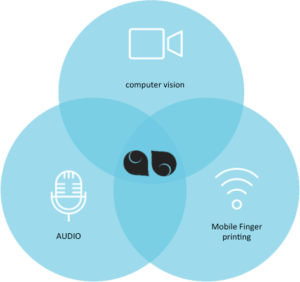
Founded in 2012 and based in Palo Alto, Percolata is making and installing sensors to detect in-store foot traffic. Percolata sensors combine video and audio from real-time traffic along with mobile fingerprinting from shoppers’ smartphones. The free traffic counters contribute to tracking the customer count for retail stores and then project traffic going forward for the website. The plug-and-play sensors and predictive analytics give the most accurate occupancy rates. Major benefits include saved manager time, increased revenue, and the improvement of customer loyalty. The platform helps the increase of sales and cut out of costs with the auto schedule feature that eliminates the problem of both over and understaffing.
Prelert: behavioral analytics for payment security
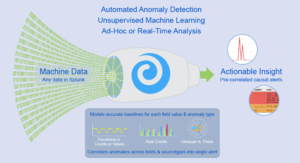 Prelert automates behavioral analytics allowing customers to discover real-time insights while minimizing the upfront investment. With Prelert, you can detect advanced threat activity such as data exfiltration and command and control communication in near real-time, identify IT security and operations problems before users report them, and catch issues that directly affect business KPIs. Also, you can find the root cause of anomalies faster and reduce false positives.
Prelert automates behavioral analytics allowing customers to discover real-time insights while minimizing the upfront investment. With Prelert, you can detect advanced threat activity such as data exfiltration and command and control communication in near real-time, identify IT security and operations problems before users report them, and catch issues that directly affect business KPIs. Also, you can find the root cause of anomalies faster and reduce false positives.
Azure ML: sales forecasting
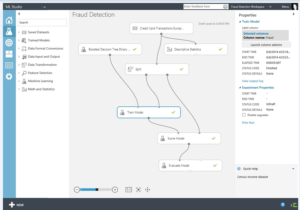
Azure is a powerful cloud-based analytics platform, which comes loaded with many different samples that include models to predict credit risk, customer churn, flight delays, and many others which will help you predict different scenarios. Azure ML allows you to include multiple prediction scenarios in the same experiment and components to easily compare the results. The platform provides many tools for data analysis, but the most comfortable choice is to do most of the work in excel and just upload .csv file into the workspace. In addition, Azure ML offers the possibility to test different sets of columns and different algorithms so that you can compare the results and pick the best performing model.
Predicting performance of fundraising campaigns
Kickstarter is a crowdfunding portal where entrepreneurs and artists look for capital for their projects. Researchers from Stanford University created a platform for predicting performance of fundraising campaigns, which has two major components: linguistic features, which include uni, bi and tri-grams from the project description and the section on risks, for predictive phrases as well as psycholinguistic features (LIWC – Linguistic Inquiry and Word Count) for categories (cognitive, inhibition), sentiment scores from comments on project page and non-text metadata.
The platform tackles the potential success of a fundraising campaign, based only on the initial description of the project – something that the project creator has full control over. It focuses on the language of the project description – in particular, phrases which are predictive of success and their psycholinguistic qualities – in addition to other metadata. Training and dev sets are used for experimenting with different estimators and model selection for the campaigns.
SmartReply: deep learning system
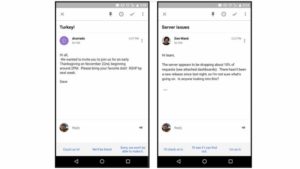 Google launched Smart Reply, a deep learning network that writes short email responses for you. When you’re checking email on the go, it can be cumbersome and time-consuming to reply to all or even some of them. What if there was a way for your inbox to guess which emails can be answered with a short reply, prepare a few responses on your behalf and present them to you, one tap away?
Google launched Smart Reply, a deep learning network that writes short email responses for you. When you’re checking email on the go, it can be cumbersome and time-consuming to reply to all or even some of them. What if there was a way for your inbox to guess which emails can be answered with a short reply, prepare a few responses on your behalf and present them to you, one tap away?
The SmartReply system is built on a pair of recurrent neural networks. One system is used to encode the incoming email and another to predict possible responses. The system can automatically determine if an email is answerable with a short reply, and composes a few suitable responses to that. The use can edit or send with just a tap. The Smar Reply feature was specially designed to the same rigorous user privacy standards any user would want: no humans reading your email. The email chat box has come to understand the semantic similarity between two responses and now it’s possible to suggest responses that are different not only in wording but in their underlying meaning as well.
RichRelevance: omnichannel personalization
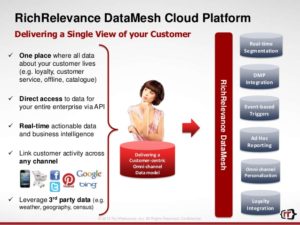 The RichRelevance helps you leverage the omnichannel data to create a 360-degree view of your customer’s shopping behaviors and preferences so that you can engage them with highly relevant experiences on your website. The RichRelevance platform allows you to personalize the entire shopper journey from engagement to product discovery to checkout on mobile devices. Marketers can now focus on introducing customized, curated content and messaging through personalization.
The RichRelevance helps you leverage the omnichannel data to create a 360-degree view of your customer’s shopping behaviors and preferences so that you can engage them with highly relevant experiences on your website. The RichRelevance platform allows you to personalize the entire shopper journey from engagement to product discovery to checkout on mobile devices. Marketers can now focus on introducing customized, curated content and messaging through personalization.
Yelp: making user-generated content valuable
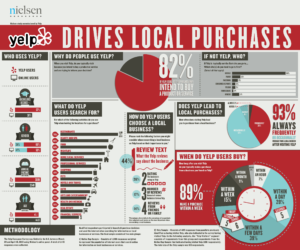 Yelp was founded in 2004 to help people find great local businesses like dentists, hair stylists, and restaurants to get more clients. Service hosts tens of millions of photos uploaded by Yelpers from all around the world and this wide variety of photos provides a rich window into local businesses.
Yelp was founded in 2004 to help people find great local businesses like dentists, hair stylists, and restaurants to get more clients. Service hosts tens of millions of photos uploaded by Yelpers from all around the world and this wide variety of photos provides a rich window into local businesses.
The business detail pages show a set of ‘cover photos’ which are recommended by photo scoring engine based on user feedback and certain photo attributes.This develops a photo understanding system which allows Yelp to create semantic data about individual photographs. The data generated by the system has been powering the recent launch of tabbed photo browsing as well as first attempts at content-based photo diversification.
Barilliance: website personalization tools for e-commerce
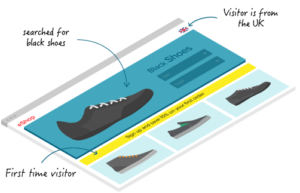 Barilliance allows targeting customers with personalized recommendations across multiple pages and multiple channels. Product recommendations are setup to take domain specific attributes that are important for your site (i.e. size, color, brands) matching their design. The platform makes it possible for emails with product recommendations to be sent to users based on their most recent activity on your site. You can decide on which pages the content will be visible and do it yourself in a few minutes without IT involvement. The system is configured to capture data instead of asking the IT department to send it. Once the system starts to collect data, there is a learning period in which data is analyzed (2- 4 weeks, depending on your traffic and catalog size).
Barilliance allows targeting customers with personalized recommendations across multiple pages and multiple channels. Product recommendations are setup to take domain specific attributes that are important for your site (i.e. size, color, brands) matching their design. The platform makes it possible for emails with product recommendations to be sent to users based on their most recent activity on your site. You can decide on which pages the content will be visible and do it yourself in a few minutes without IT involvement. The system is configured to capture data instead of asking the IT department to send it. Once the system starts to collect data, there is a learning period in which data is analyzed (2- 4 weeks, depending on your traffic and catalog size).
Lumidatum: predictive analytics and data science
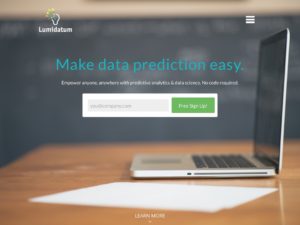 Lumidatum is a revolutionary automated data science platform that helps you discover and act on your data. The platform uses algorithms to discover deep insights about your customers and then turning the data into a competitive advantage by identifying what offer when to send it and to whom. The Lumidatum machine learning system let’s you find new revenue streams fueling the growth of your business. You can use data science to optimize merchandising, make product recommendations and identify your best customers. The platform helps you provide a dynamic and personalized experience for your customers boosting loyalty and engagement. It enables data preparation and cleansing through model building to utilizing and launching predictions in your own apps and platforms.
Lumidatum is a revolutionary automated data science platform that helps you discover and act on your data. The platform uses algorithms to discover deep insights about your customers and then turning the data into a competitive advantage by identifying what offer when to send it and to whom. The Lumidatum machine learning system let’s you find new revenue streams fueling the growth of your business. You can use data science to optimize merchandising, make product recommendations and identify your best customers. The platform helps you provide a dynamic and personalized experience for your customers boosting loyalty and engagement. It enables data preparation and cleansing through model building to utilizing and launching predictions in your own apps and platforms.
Advancements in Artificial intelligence’s application have led to the development of AI systems which have proved useful to marketers and salesperson. Right now you can predict in-store customer traffic or fundraising campaign, use deep learning systems, make user-generated content valuable and target customers with personalized recommendations across multiple pages and multiple channels. The days of guessing, spraying and praying are over. Humans can come out of the equation, and machines will do the planning, strategizing and execution to grow your business.
Author: AI.Business
If you like our articles, please subscribe to our monthly newsletter:
[mc4wp_form id=”763″]